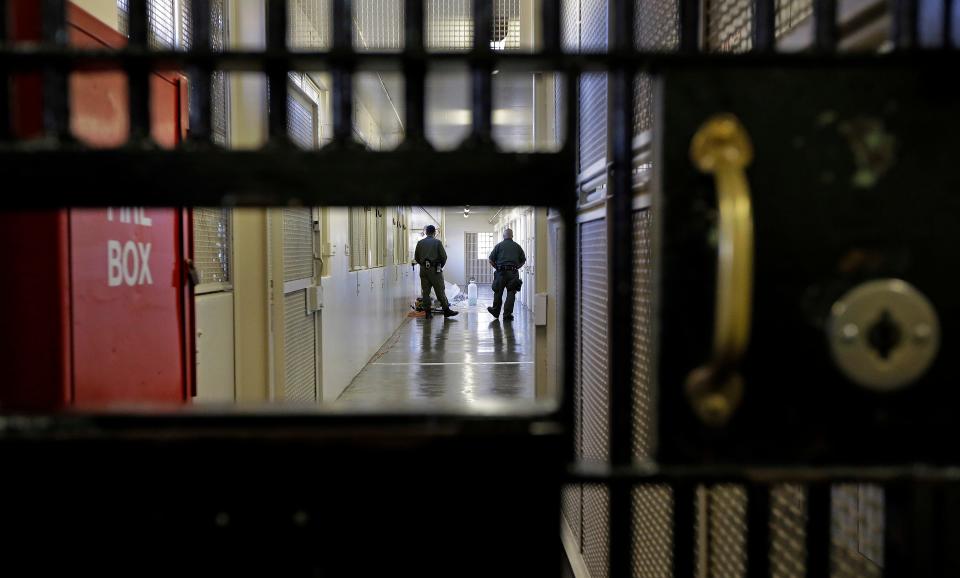Infectious disease expert, former attorney general: Prioritize COVID vaccines for inmates
Last month, a federal judge in Oregon ordered the state to immediately offer the COVID-19 vaccine to people in prison — the first ruling of its kind in the nation. Prioritizing the inoculation of people behind bars has stirred political backlash in some corners of our country. But it’s a public health measure that makes good sense.
Few places are more hospitable to the coronavirus than prisons and jails. Their cramped and crowded spaces, poor ventilation, lack of room for physical distancing and high rates of chronic disease converge to make viral transmission more possible and, in some cases, more hazardous than in other environments.
Given such conditions, correctional facilities are incubators for superspreader events, as national numbers vividly show. The COVID-19 death rate in prison has been shown to be twice that of the general population, after adjusting for the sex, age and race/ethnicity of those behind bars. In five states, incarcerated people have been dying of the disease at more than seven times the rate of those outside prison walls.

As members of the National Commission on COVID-19 and Criminal Justice, we have become well versed in these and other grim statistics, and we know that many of the largest reported clusters have occurred behind bars. Along with our fellow commissioners, we spent much of 2020 investigating the impacts of the coronavirus on our justice system and producing two sets of recommendations on how to curb its spread.
One of those recommendations advised governments to prioritize incarcerated people for vaccination, not at the tiptop of the list, but in Phase 1b, along with essential workers in the criminal justice system. The American Medical Association is among other groups that endorse prioritizing prisons in the vaccine rollout as a public health step.
Lacking firm national guidance on the issue, states have been inconsistent in their response. A Prison Policy Initiative report shows that only 10 states have included incarcerated individuals for Phase 1 vaccination, and 18 states deferred the population to Phase 2. Some states have prioritized correctional staff, but not incarcerated people; others have not released details of their plans.
Massachusetts is one state that is vaccinating people in prison. Republican Gov. Charlie Baker summed up the logic this way: “These facilities are prioritized because they serve vulnerable populations in densely populated settings, which means they're at significant risk for contracting COVID-19.”
In other states, however, things look very different.
Florida corrections officials, for example, have requested vaccine doses and identified thousands of elderly inmates who meet the state’s eligibility requirements. But while nearly 1,200 people incarcerated in federal prison in Florida have been fully inoculated, Republican Gov. Ron DeSantis has yet to make vaccines available to those in state lockups.
Elsewhere, leaders have grappled with the argument that people behind bars don’t deserve “special” treatment. So it went in Colorado, where the state’s medical advisory group — physicians, public health officials and experts in bioethics — developed a vaccination framework that prioritized people in prison. That created an uproar, prompting Democratic Gov. Jared Polis to reverse course and declare: “There's no way it's going to go to prisoners before it goes to people who haven't committed any crime.”
Polis is not the only elected official caught in the crosshairs as America grapples with a deadly virus, limited vaccines and clashing values. But stopping epidemics at their source is a fundamental tenet of public health, and vaccinating those who are at high risk of being infected and suffering worse outcomes are two essential priorities for responding to COVID-19.
It’s also true that despite misperceptions, prisons and jails are not isolated bunkers. Every day large numbers of officers, lawyers, medical providers, administrators and others enter and exit correctional facilities. A single infection can drive a fast-growing outbreak that threatens not just incarcerated people but surrounding communities.
In Chicago, for example, researchers found that nearly 16% of infections were linked to people going in and out of the Cook County jail. In California, a transfer between facilities led to a severe outbreak at San Quentin State Prison. After more than 2,100 incarcerated people were infected and 28 inmates and an officer died, a federal judge ruled that the state had shown “deliberate indifference” to the health of those imprisoned and ordered that 1,000 people be transferred or released.
Ruling on the case in Oregon, where about 1 in 4 people incarcerated have tested positive for COVID-19 and 42 have died, U.S. Magistrate Stacie Beckerman found that "the Eighth Amendment imposes an obligation on Defendants to protect the people in their custody because they cannot protect themselves.”
“Our constitutional rights are not suspended during a crisis,” Beckerman wrote. She ordered that inmates in Oregon’s prisons be offered vaccines as soon as possible, and Democratic Gov. Kate Brown did not appeal.
We support that decision. Because protecting our communities means protecting those most vulnerable to infection, wherever they may live.
Tom Inglesby, M.D., is director of the Center for Health Security at Johns Hopkins Bloomberg School of Public Health and a member of the National Commission on COVID-19 and Criminal Justice.
Alberto Gonzales, who chairs the commission, served as U.S. attorney general under President George W. Bush and is now the dean for Belmont University College of Law.
You can read diverse opinions from our Board of Contributors and other writers on the Opinion front page, on Twitter @usatodayopinion and in our daily Opinion newsletter. To respond to a column, submit a comment to letters@usatoday.com.
This article originally appeared on USA TODAY: Inmates need early COVID vaccines. Matter of public health, not politics

